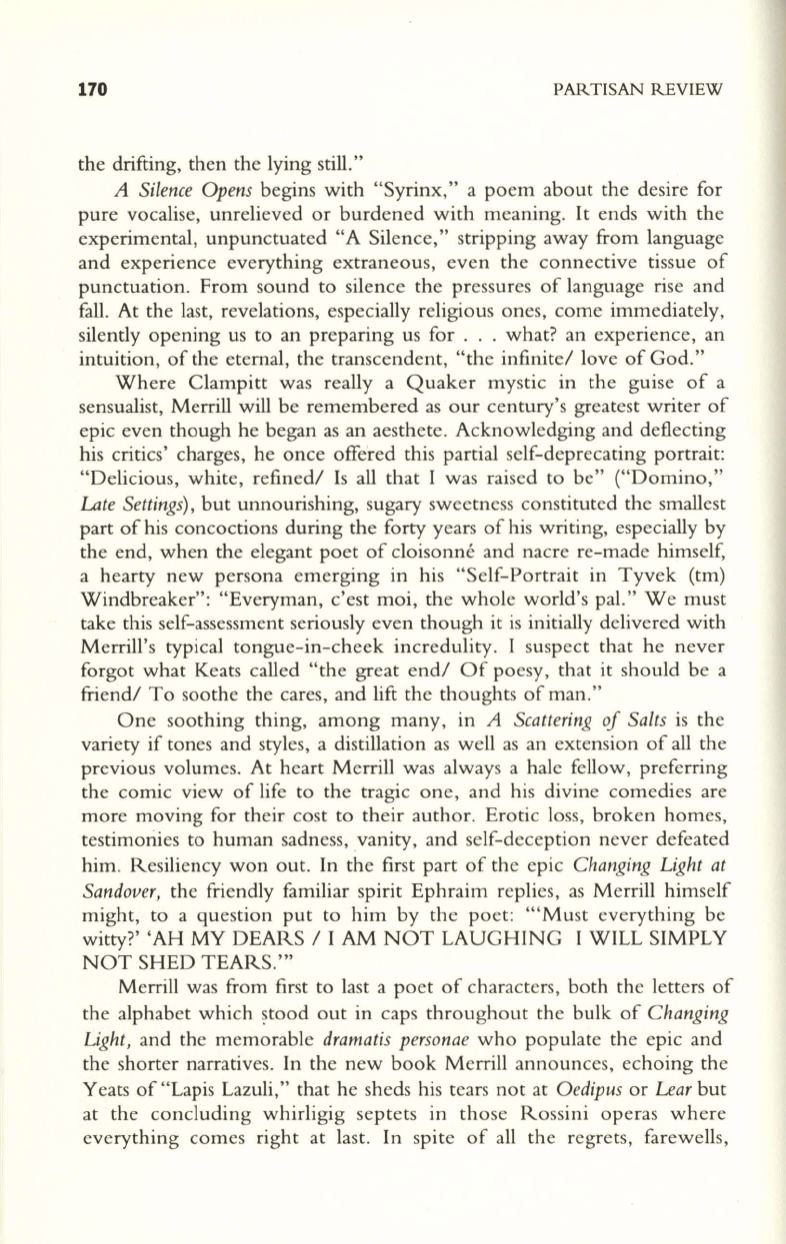
170
PARTISAN REVIEW
the drifting, then the lying still."
A Silence Opens
begins with "Syrinx," a poem about the desire for
pure vocalise, unrelieved or burdened with meaning. It ends with the
experimental, unpunctuated "A Silence," stripping away from language
and experience everything extraneous, even the connective tissue of
punctuation. From sound to silence the pressures of language rise and
fall. At the last, revelations, especially religious ones, come immediately,
silently opening us to an preparing us for . . . what? an experience, an
intuition, of the eternal, the transcendent, "the infinite/ love of God."
Where Clampitt was really a Quaker mystic in the guise of a
sensualist, Merrill will be remembered as our century's greatest writer of
epic even though he began as an aesthete. Acknowledging and deflecting
his critics' charges, he once offered this partial self-deprecating portrait:
"Delicious, white, refined/ Is all that I was raised to be" ("Domino,"
LAte Settings),
but unnourishing, sugary sweetness constituted the smallest
part of his concoctions during the forty years of his writing, especially by
the end, when the elegant poet of cloisonne and nacre re-made himself,
a hearty new persona emerging in his "Self-Portrait in Tyvek (tm)
Windbreaker": "Everyman, c'est moi, the whole world's pal." We must
take this self-assessment seriously even though it is initially delivered with
Merrill's typical tongue-in-cheek incredulity. I suspect that he never
forgot what Keats called "the great end/ Of poesy, that it should be a
friend/ To soothe the cares, and lift the thoughts of man."
One soothing thing, among many, in
A Scattering of Salts
is the
variety if tones and styles, a distillation as well as an extension of all the
previous volumes. At heart Merrill was always a hale fellow, preferring
the comic view of life to the tragic one, and his divine comedies are
more moving for their cost to their author. Erotic loss, broken homes,
testimonies to human sadness, vanity, and self-deception never defeated
him. Resiliency won out. In the first part of the epic
Changing Light at
Sandover,
the friendly familiar spirit Ephraim replies, as Merrill himself
might, to a question put to him by the poet: "'Must everything be
witty?' 'AH MY DEARS / I AM NOT LAUGHING I WILL SIMPLY
NOT SHED TEARS.'"
Merrill was from first to last a poet of characters, both the letters of
the alphabet which
~tood
out in caps throughout the bulk of
Changing
Light,
and the memorable
dramatis personae
who populate the epic and
the shorter narratives. In the new book Merrill announces, echoing the
Yeats of "Lapis Lazuli," that he sheds his tears not at
Oedipus
or
Lear
but
at the concluding whirligig septets in those Rossini operas where
everything comes right at last. In spite of all the regrets, farewells,


